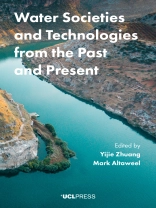Today our societies face great challenges with water, in terms of both quantity and quality, but many of these challenges have already existed in the past. Focusing on Asia, Water Societies and Technologies from the Past and Present seeks to highlight the issues that emerge or re-emerge across different societies and periods, and asks what they can tell us about water sustainability. Incorporating cutting-edge research and pioneering field surveys on past and present water management practices, the interdisciplinary contributors together identify how societies managed water resource challenges and utilized water in ways that allowed them to evolve, persist, or drastically alter their environment.
The case studies, from different periods, ancient and modern, and from different regions, including the Indus Basin, the Yangtze River, the Mesopotamian floodplain, the early Islamic city of Sultan Kala in Turkmenistan, and ancient Korea, offer crucial empirical data to readers interested in comparing the dynamics of water management practices across time and space, and to those who wish to understand water-related issues through conceptual and quantitative models of water use. The case studies also challenge classical theories on water management and social evolution, examine and establish the deep historical roots and ecological foundations of water sustainability issues, and contribute new grounds for innovations in sustainable urban planning and ecological resilience.
Praise for Water Societies and Technologies From the Past and Present
’Incorporating research and field surveys on past and present water management practices, the interdisciplinary contributors to this book together identify how societies managed water resource challenges and used water in ways that allowed them to evolve, persist, or drastically alter their environment.’
AWWA, American Water Works Association
Spis treści
1. Introduction: Interdisciplinary research into water management and societies
Yijie Zhuang and Mark Altaweel
Part I: Modelling long-term change
2. Holocene evolution of rivers, climate and human societies in the Indus basin
Peter D. Clift and Liviu Giosan
3. Habitat hysteresis in ancient Egypt
Judith Bunbury
4. Geoarchaeology of prehistoric moated sites and water management in the Middle River Yangtze, China
Duowen Mo and Yijie Zhuang
5. Rice fields, water management and agricultural development in the prehistoric Lake Taihu region and the Ningshao Plain
Yijie Zhuang
Part II: Technologies across time and space
6. Recognition criteria for canals and rivers in the Mesopotamian floodplain
Jaafar Jotheri
7. The Udhruh region: A green desert in the hinterland of ancient Petra
Mark Driessen and Fawzi Abudanah
8. Flowing into the city: Approaches to water management in the early Islamic city of Sultan Kala, Turkmenistan
Tim Williams
9. Water management across time: Dealing with too much or too little water in ancient Mesopotamia
Mark Altaweel
10. Framing urban water sustainability: Analysing infrastructure controversies in London
Sarah Bell
Part III: Water and societies
11. Early Indian Buddhism, water and rice: Collective responses to socio-ecological stress: Relevance for global environmental discourse and Anthropocene studies
Julia Shaw
12. Water for the state or water for the people? Wittfogel in South and South East Asia in the first millennium
Janice Stargardt
13. Agricultural development, irrigation management and social resilience in ancient Korea
Heejin Lee
14. Quoting Gandhi, or how to study ancient irrigation when the future depended on what one did today
Maurits W. Ertsen
O autorze
Yijie Zhuang is Associate Professor in Chinese Archaeology at the UCL Institute of Archaeology. He has conducted intensive fieldwork in different parts of East and Southeast Asia. He is primarily interested in the reconstruction of water management systems and agricultural ecologies of both the monsoonal and arid regions of Asia and how these related to long term social evolution.












